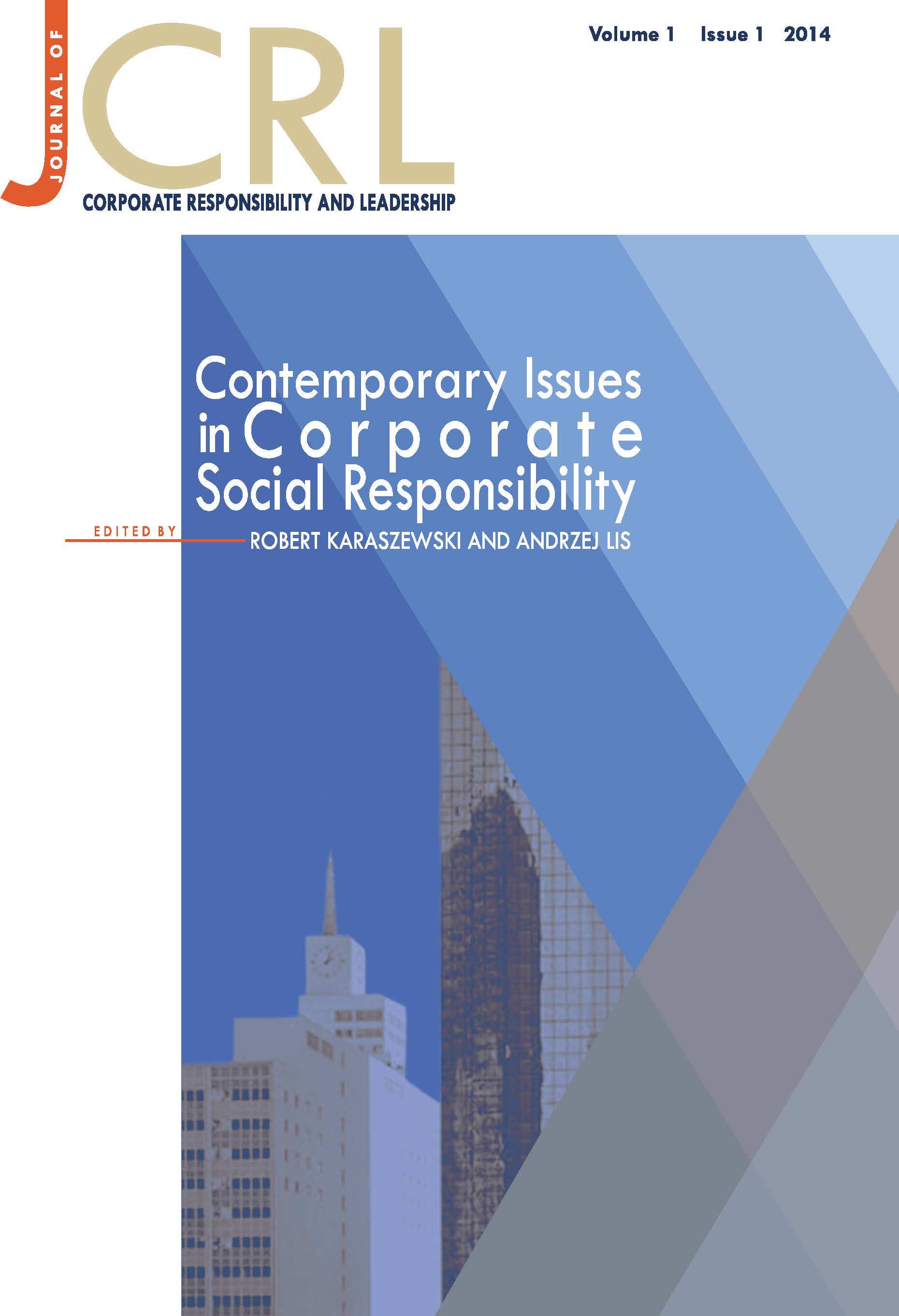Dialogue with the environment: A new challenge for the practice of responsible leadership
DOI:
https://doi.org/10.12775/JCRL.2014.002Palabras clave
sustainability governance, responsible management, stakeholder panels, stakeholder engagementResumen
The paper copes with the issue of the company dialogue with its stakeholders, which is considered to be one of the contemporary challenges for management and business leaders. I t reviews not only theoretical approach, but is the discussion of today’s business practice. I t focuses on the constructive critique of “stakeholders panels”, which show to be ineffective. The aim of the paper is to propose an alternative governance solution, which may make sustainability governance more effective.
Citas
Dymowski, J. (2012), Problemy wpływu społecznej odpowiedzialności biznesu na wyniki finansowe przedsiębiorstwa, SGH, Warszawa, (Ph.D. thesis).
Dymowski, J. (2014), “Dialog jako źródło wartości biznesowej”, in: Dialog z interesariuszami: Jak rozmawiać, czyli jak usłyszeć i jak zostać wysłuchanym, Konfederacja Lewiatan, Warszawa, pp. 30-49.
Evan, W.M., Freeman, R. (1988), “A Stakeholder Theory of the Modern Corporation: Kantian Capitalism”, in: Beauchamp, T., Bowie, N. (Eds.), Ethical Theory and Business, Prentice Hall, New York, pp. 75-93.
Freeman, R. (1984), Strategic Management: A Stakeholder Approach, Pitman, Boston.
Freeman, R., Liedtka, M. (1991), “Corporate Social Responsibility: A Critical Approach”, Business Horizons, Vol. 34, Issue 4, pp. 92-99.
Freeman, R., Liedtka, M. (1991), “Corporate Social Responsibility: A Critical Approach”, Business Horizons, Vol. 34, Issue 4, pp. 92 – 99. DOI: http://dx.doi.org/10.1016/0007-6813(91)90012-k
Freeman, R., Reed, D. (1983), “Stockholders and Stakeholders: A New Perspective on Corporate Governance”, in: Huizinga C.J. (Ed.), Corporate Governance: A Definitive Exploration of the Issues, University Press, Los Angeles. DOI: http://dx.doi.org/10.2307/41165018
Freeman, R., Velmuri R., (2006), “A New Approach to CSR: Company Stakeholder Responsibility”, in: Kakabadse, A., Morsing, M. (Ed.), Corporate Social Responsibility (CSR): Reconciling Aspirations with Application, Palgrave Macmillan, Basingstoke, pp. 9-23.
GRI (2013), G4 Sustainability Reporting Guidelines: Reporting Principles and Standard Disclosures, Global Reporting Initiative, Amsterdam.
Jensen, M. (1984), “Agency Costs of Free Cash Flow, Corporate Finance, and Ownership Structure”, American Economic Review, Vol. 76, No. 2, pp. 323-329.
Jones, T. (1980), “Corporate Social Responsibility Revisited, Redefined”, California Management Review, Vol. 22, Issue 3, pp. 59-67. DOI: http://dx.doi.org/10.2307/41164877
Mele, D. (2009), “Corporate Social Responsibility Theories”, in: Crane, A., Matten, D., McWilliams, A., Moon, J., Siegel, D.S. (Eds.), The Oxford Handbook of Corporate Social Responsibility, Oxford University Press, Oxford, pp. 47-83. DOI: http://dx.doi.org/10.1093/oxfordhb/9780199211593.003.0003
Marcoux, A.M. (2000), “Balancing Act”, in: Dasjardins J., MacCall J. (Eds.), Contemporary Issues in Business Ethics, Wadsworth, Belmont, pp. 1-24.
Obłój, K. (2010), Pasja i dyscyplina strategii: Jak z marzeń i dyscypliny zbudować sukces firmy, Poltext, Warszawa.
PN-ISO 26000 (2011), Wytyczne dotyczące społecznej odpowiedzialności, PKN, Warszawa.
Sternberg, E. (2000), Just Business: Business Ethics in Action, Oxford University Press, Oxford. DOI:
">http://dx.doi.org/10.5860/choice.39-1668
Descargas
Publicado
Cómo citar
Número
Sección
Stats
Number of views and downloads: 488
Number of citations: 0



